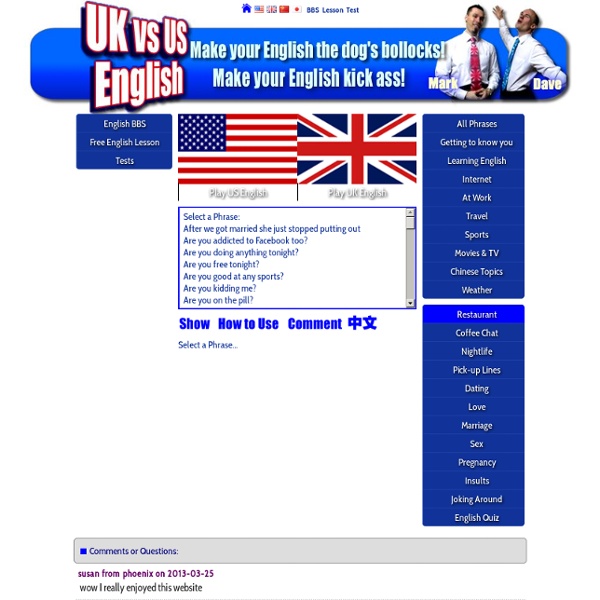



http://usukenglish.com/index-en.php
Related: SpeakingPronunciation Welcome to EnglishClub Pronunciation for ESL learners. If your questions about pronunciation are not answered here, feel free to ask a question at the Help Each Other With English forum. pronunciation (noun): the way in which we pronounce a wordpronounce (verb): to make the sound of a word Introduction to Coordinate Graphing Introduce elementary students to coordinate graphing through seasonal coloring activities. The fall Jack-O-Lantern activity requires students to use the grid code and crayons or markers to create a jack-o-lantern on a blank 9x9 grid. The use of letters on the horizontal axis and numbers on the vertical axis introduces young students to coordinate pairs without the confusion of the standard (h,v) format. Speaking Activities On these pages you will find ideas for classsroom activities which involve speaking. (These tips are taken on this site · Find the murderer · Bingo mingle · Short projects to get them talking - Lists · Superlative questions
Kid Conversation Starters - All Pro Dad : All Pro Dad Sometimes being a dad is just tough. I recently had a real talk with my 8-year-old son about a kid who was trying to bully him. I don’t know if my advice was the best, but I believe it opened the door for deeper conversations in the future. Walk and talk med elever Idag under engelsklektionen gick vi ut på gården och hade ”Walk and talk” i ca 30 min. Eleverna fick själva göra gruppindelningen utifrån ”hitta någon du känner dig trygg att prata engelska tillsammans med”. De delade upp sig i par eller i grupper om 3. Jag har haft eleverna i flera år nu och vet att de kan göra denna indelning under eget ansvar men detta måste du som lärare kanske styra upp så att alla hittar en kamrat. Det var samma grupper under hela passet men samtalsinnehållet varierade. Eleverna fick ett ämne att samtala om av mig som de diskuterade under en promenad.
5 of My Favorite English Games for ESL Students I saved the best for last. My students requested this game more often than any other game we ever played. It's based on the old drinking game "Ring of Fire," modified for the classroom. Materials needed:A standard deck of playing cards, a whiteboard, 20-30 small slips of blank paper, and a bowl. The setup:Almost none! Place the bowl in the center of a table and spread the cards out, face down, in a circle around the bowl. Speakingactivities Frustrerad ställer jag en fråga i facebookgruppen Engelska för år 6-9 där jag söker råd och hjälp kring hur andra brukar göra med grupper som inte vill eller vågar tala engelska. Tycka vad man vill om sociala medier, men att under en dag kunna diskutera problemet med lärare som är spridda över hela Sverige tycker jag är fantastiskt. I gruppen finns också deltagare från Finland och Norge. Råd och tips strömmar in och många känner igen i sig problemet.
BusyTeacher.org It’s only natural. After all, they are trying to talk in a language they are still working on learning. Still, silence can be deadly in the ESL classroom for your students and you. When you want to get your students to speak up, try one of these fun and simple games to get them talking in class. 1This is How We RollYou can use this simple game as a get to know you at the start of school or later as a get to know you better activity. Agreeing and Disagreeing in English This page is about words and phrases that we use when we agree or disagree with someone in English. Stating an opinion In my opinion...The way I see it...If you want my honest opinion....According to Lisa...As far as I'm concerned...If you ask me... Asking for an opinon What's your idea?
The Plot The Plot The Plot Question time! What is it that you think they wanted? What do you think is in the barrels?